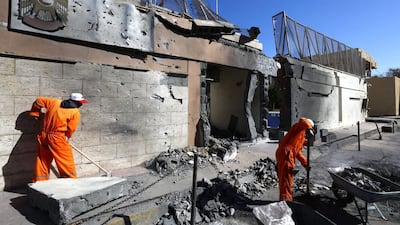ABU DHABI // The UAE on Saturday named 83 organisations it considers terror groups.
They include the Muslim Brotherhood, its UAE branch Al Islah, ISIL, Al Qaeda and the Houthi rebels in Yemen.
Although a number of organisations on the list had previously been named, it is the first the Government has released an official list.
This follows the passage of Federal law 7 of 2014 on combating terrorist organsiations. The law was discussed in an extraordinary session of the Federal National Council earlier this year when the 40-member body was summoned amidst their parliamentary break to debate the law.
The law required the full list of groups the UAE sees as terrorist organisations to be published in media for “transparency and to raise awareness among all members of society of these organisations”.
The list also includes a number of groups in Egypt and Syria, as well as Yemen, Palestine, and Lebanon.
The Government has supported Saudi Arabia’s designation of the Brotherhood as a terrorist group but has not explicitly named it until now.
Naming the terror groups comes as the UAE implements more assertive policies at home and abroad to counter the spread of political Islam.
The government backed the decision last year by Egypt's military to remove the Islamist president Mohammed Morsi after large-scale demonstrations against his rule, and when Islamist militias in Libya took over Tripoli this year the UAE offered support to the democratically elected government in the east of the country.
The UAE has also joined the US-led coalition against ISIL and its air force is involved in airstrikes against the militants in Syria.
"We have been an integral part of the operation," the commander of the UAE air force, Major General Ibrahim Al Alawi, told The Washington Post. "We have shown that we can do the job."
Along with well-known groups such as Ansar Al Sharia and the Pakistani Taliban, the terror list include lesser known organisations such as the Islamic Association in Finland and the Cordoba Foundation in the UK. The list also includes the Union of Muslim Scholars in Qatar, headed by the inflammatory preacher Youssef Al Qaradawi; the Badr Organisation, an Iraqi Shiite political party and militia backed by Iran; and the Abdullah Azzam Brigades, the Emirati Jihad cells, Boko Haram in Nigeria and the Tawhid Brigade in Syria.
Abdulkhaleq Abdullah, a professor of political science at Emirates University, described the list as the most comprehensive by the UAE that he knew of.
The international scope of the designations underscores how the UAE, one of the few bastions of stability in the Middle East, is enacting tough measures against extremist groups to prevent any threat to its security.
“I think the UAE has gone to a policy of what I would call pre-emptive defence, meaning going to the source before they reach here,” Prof Abdullah said.
He pointed out that updated antiterrorism legislation had taken effect in August, with harsh punishments for anyone found guilty of extremist actions or affiliations.
While the list shows the breadth of the UAE’s definition of terrorism, making it public is also a step towards making government policy more transparent.
Mr Abdullah said the lists inform people “in the country that these are the bad guys, to stay away from them and to stay away from financing them”.
The decision to combat Islamists has not been without repercussions. On Thursday, car bombs exploded outside the shuttered UAE and Egyptian embassies in Tripoli.
The Minister of Foreign Affairs, Sheikh Abdullah bin Zayed, blamed the attack on Ansar Al Sharia and the Fajr Libya Islamist militias.
The UAE’s strong stance has increased tension with Qatar, which backs groups such as the Muslim Brotherhood.
That support has also put Qatar at odds with Bahrain and Saudi Arabia, which included the Brotherhood on a list of terror designations released in March.
Prof Abdullah welcomed the UAE’s release of its own list. “It’s a rather long list. The UAE has taken upon itself a hard job in fighting these bad guys,” he said.
But the effort was aimed at keeping “the homeland as safe and secure as possible”.
osalem@thenational.ae
jvela@thenational.ae

